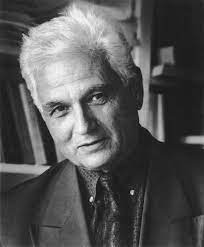Derrida, Jacques

Bio: (1930-2004) Algerian-French philosopher. Jacques Derrida was born in Algeria, and at the beginning of his studies, he moved to France. He studied at the École normale supérieure, where he later taught. He continued his academic career in France at the Sorbonne and École des hautes études en sciences sociales, while in the United States, he taught at Yale University and the University of California, Irvine. Derrida has made a huge contribution to many fields: philosophy, linguistics, psychoanalysis, cultural studies, art history, and others. Derrida's multiple intellectual contributions are most often marked by the term deconstruction, a term he introduced in his book Of Grammatology (1994, in French 1967a).
Deconstruction, the philosophical current that Derrida started, seeks to reveal instabilities and inconsistencies in Western intellectual traditions. Western culture tends to seek absolute truths and meanings, and it is deconstruction that tends to challenge that absolute knowledge, as a philosophical and literary method of criticism. Derrida calls the search for absolute truths and meanings "transcendental signified" because such knowledge is presented as universal knowledge, which can be translated into any language and context. The desire to discover absolute truths is also called "logocentrism", which is associated with "phonocentrism", the practice of valuing speech more than the written word. Derrida believes that all the processes of signification represent the form of the written word, and that fact undermines the presumed unity of language and meaning in speech.
The subject of deconstruction is also the structuralism of Ferdinand de Saussure. Saussure believed that the relationship between the signified and the signifier is stable and that the signified always has a strictly defined relationship with a concept. Derrida believes that the relationship between the signified and the signifier is always open and that the meaning contained in the signified is always arbitrary, so the signified cannot represent an objective reality. Structuralism presupposes the existence of a unity in language, a unity with organized elements that stand in stable relations, while deconstruction abandons such a rigid image. If signs do not have inherited stability, then meaning alone cannot have such stability. Meaning is a function of the differences between terms. A game of infinite differences within the text produces the possibility of multiple meanings.
Deconstruction breaks down absolute truths, reveals key binary oppositions in the text, and then reveals the dependence and hierarchical relationship of those oppositions, while the next step shows that these relationships are relative, revealing the absurdity of absolute truth/knowledge itself. It is necessary to find instabilities, ambiguities in meaning, contradictions, and excluded elements from the structure of the text. His analysis of language and literature represents a radical view of writing. Derrida believes that each text contains the seeds of its own destruction. He believes that writing does not reproduce a single reality, but produces multiple realities. Deconstruction takes place at the level of the text, but also in the very interpretations of the text. After the end of the deconstruction, what remains, in the end, is the text itself. This opens up a space for constant reflection and creative thinking, which allows us to "play" with the text. Derrida advocates an open text in which reality is in a constant state of linguistic fluidity.
Main works
De la grammatologie (1967a);
La Voix et le Phénomène (1967b);
L'Écriture et la différence (1967c);
La dissémination (1972);
De l'esprit (1987);
Limited Inc. (1990);
Spectres de Marx (1993);
Politique et amitié (1994).
Main works translated into English:
Speech and Phenomena and Other Essays on Husserl's Theory of Signs (1973, in French 1967b);
Dissemination (1981, in French 1972);
Limited Inc. (1988);
Of Spirit: Heidegger and the Question (1989, in French 1987);
Specters of Marx (1994, in French 1993);
Of Grammatology (1998, in French 1967a);
Acts of Religion (2001);
On Cosmopolitanism and Forgiveness (2001);
Writing and Difference (2017, in French 1967c);
The Gift of Death, Second Edition & Literature in Secret (2017);
Heidegger: The Question of Being and History (2019);
Deconstruction in a Nutshell: A Conversation with Jacques Derrida, With a New Introduction (2020);
The Politics of Friendship (2020, in French 1994).

